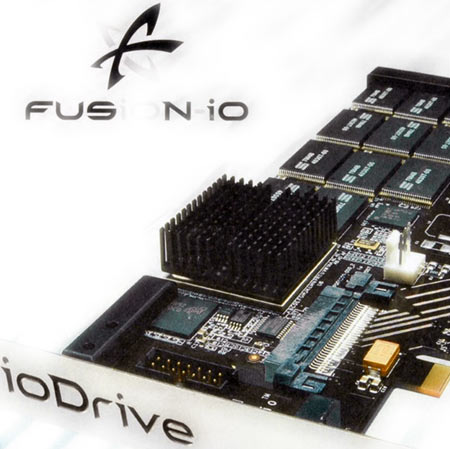Can The Flash-Based ioDrive Redefine Storage Performance?
Can Fusion-io Trigger A Meltdown For Hard Drive Makers?
“Breaking all performance barriers” is what you read when you check out the Fusion-io Web site at www.fusionio.com. We’ve read such statements many times in the past, of course, and they turned out to be true in only a few cases. The device's spec sheet will give you even more enticement: 700 MB/s read throughput, more than 100,000 I/O operations per second—these are numbers that are actually getting close to DRAM performance. Can it be true? We looked at the ioDrive in great detail to find out.
Flash Memory on PCI Express
The concept sounds rather simple: Fusion-io takes a PCI Express add-on card and puts Flash memory and a powerful controller on it. The result is the ioDrive, which in fact should not necessarily be called a drive, as it has little to do with hard drives as we know them. Fusion-io calls its product a NAND flash cluster, and it was designed to provide DRAM-like performance. In fact the ioDrive cannot be used as a drive: it connects via PCI Express and hence it is not possible to boot an operating system from it--at least not yet--Fusion-io says it is working on that...
Application scenarios for this product are few in the desktop space; the product was designed for high performance servers. That said, it is definitely possible to install it into any desktop PC that has a x4 or wider PCI Express slot, if you think you have an application for it. When we first received the sample we were still limited to Linux, but Windows 64-bit drivers have been around for several weeks now. There are no 32-bit drivers available at this point.
The Perfect Flash Drive?
Let me lead by saying that both the specified figures and our measured performance numbers are more than impressive. That comment does not apply to the many hundred megabytes per second of throughput, as this can be handled by a few fast hard drives. But the large number of I/O operations per second is crucial for mission critical applications that depend on maximum I/O performance. Think of banking transactions, weather forecasting, seismic analysis, particle accelerators, warehouse solutions… anything that requires accessing or storing tremendous amounts of data in compact chunks will benefit a lot from better I/O performance.
We don’t know of any flash SSD that would be validated for these sorts of applications; FusionIO might have a significant advantage, as the ioDrive was the first to achieve IBM’s “ServerProven” designation. In other words: IBM wants to use this drive in scenarios that may be business critical, or that could even contribute to making big steps in the areas of science or business.
Get Tom's Hardware's best news and in-depth reviews, straight to your inbox.
Current page: Can Fusion-io Trigger A Meltdown For Hard Drive Makers?
Next Page Fusion-io ioDrive Details